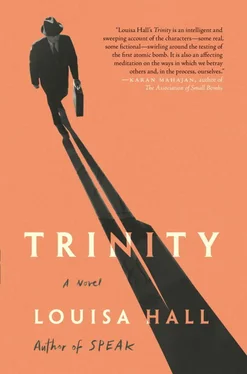Chester, too, was called to account, and reading his answers—though I was so far away, sitting alone at that café while the roosters crowed under that jellyfish sky—I felt myself returning to those last months in Washington. I felt the suspicions that had caused me to stay awake all night, watching Alice, looking for signs.
In that spirit, I kept reading and copying notes, even though at some point I began to feel that I was prying unforgivably into the corners of another person’s private life, such as when the prosecutors began to question him about the nature of his relationship with that girlfriend in San Francisco.
They quoted a letter he’d written in Princeton, answering each of their accusations, in which he’d explained that he and Jean Tatlock met in 1936. They’d grown very close, he said. Twice they were close enough to marriage to think of themselves as engaged. But between his marriage to Kitty in 1939 and her death in 1944, they only saw each other rarely. Her Communist beliefs had wavered by then. They never quite seemed to provide what she was seeking. Then he said that he did not believe she was a truly political person; rather, she was a person of deep religious feeling. She loved this country, its people, and its life.
Having read this account, the prosecutor looked at Chester over the table. Kitty was sitting behind him. The prosecutor asked whether, between 1939 and 1944, his relationship with Jean was casual.
Their meetings were rare, Chester said, but not casual. They had been deeply involved. There was still strong feeling when they saw each other.
How many times, the prosecutor wanted to know, did you see her between 1939 and 1944?
Chester guessed ten times in five years.
He had seen her, he said, socially with other people. He had seen her on New Year’s of 1941, when he went to her house, and afterward they went out for a drink at the Top of the Mark. She had come more than once to visit his new home in Berkeley, and he had visited her at her father’s house. And he had gone to see her in June of 1943, when he was directing the Manhattan Project.
Now the prosecutor was really licking his chops. “You said you had to see her,” he said. “Why did you have to see her?”
Chester tried to answer well. She had wanted to see him before he left San Francisco to relocate to Los Alamos, but he hadn’t gone then. He had felt, at that time, that he had to keep his destination a secret. But he’d wanted to go. He’d known she was unhappy.
“I felt,” he said, “that she had to see me.”
“Why did she have to see you?” the prosecutor asked.
“Because she was still in love with me,” Chester said.
“Where did you see her?” the prosecutor asked.
“At her home, on Telegraph Hill.”
“You spent the night with her, didn’t you?”
“Yes.”
“Did you see her again after that?”
“She took me to the airport,” Chester said, “and I never saw her again.”
And still the prosecutor wouldn’t let up. Was it good security, he wanted to know, to spend the night with a woman who was loyal to the Communist Party?
“Oh, but she wasn’t,” Chester said.
How did you know? the prosecutor said.
“I knew her,” Chester said.
I knew her.
That was the best answer he could come up with, in that room, surrounded by lawyers, with Kitty sitting immobile behind him.
BY THE TIME I’D FINISHED COPYING THAT, I FELT REALLY SICK. THEN Ireturned the transcripts to the library. I drove home in a strange mood, and the next time we saw Kitty and Chester, I couldn’t help watching them a little more closely.
Nancy was probably right that they drank more than was healthy. And they never ate much. But they seemed to enjoy their life on the island. They chewed whelks like the natives. They went sailing together. They brought their daughter with them, and while the cottage was still getting built, they lived on the beach in two tents that they struck, sheltered in the back by a cluster of mangroves.
One night they came to have dinner with us at the hotel, and when Chester heard I’d built houses in Brazil before I met Alice, he asked my advice on tile work and cement.
He wasn’t ashamed to ask for my help. When I talked, he listened carefully. He never interrupted. I felt he valued the opinions I gave, and sometimes, when they’d gone back to Princeton, he’d call and ask if I’d head out to their beach to oversee the contractor.
Even when he was on the island, he often asked for my help overseeing his workers. He didn’t have the personality to manage construction. Sometimes I wondered how he managed that entire bomb project. One day, when I wasn’t there, his workers laid the foundation wrong and started building too close to the water.
When Chester asked them what happened, the contractor just shrugged and said a donkey ate the surveyor’s plans.
So then Chester gave up, and if he needed something changed or done better, he’d call me, and I’d drive over and order people around, or check on the quality of the tin they shipped in, or the terra-cotta tiles he’d ordered.
At night, when the workers had gone home, he and Kitty threw wonderful parties. They strung the mangrove trees with little white lights. They hired a scratchy band to play calypso, and they served good champagne, and Alice and I learned to eat dinner beforehand, because they never served enough food. Once they only served seaweed. Another time there was a thin vichyssoise. But by then, we knew what to expect, and Alice was doing so well that she didn’t even look at the champagne as it was poured into people’s glasses.
We sat together in the cold sand and held hands. Sometimes she got up to dance, but she always came back. She drank seltzer with lime, and afterward, we’d go back to the hotel, and even before the elevator had shut its doors behind us, we were already undressing each other.
When we got to the room, we didn’t turn on any lights. I’d lie down and close my eyes and she’d kiss my eyelids and my cheekbones and the small oval pool of my throat, that place where rain could have been caught, where tide pools could have formed and minnows could have survived until the next tide rose to return them.
I kept my eyes closed, and I felt the touch of Alice’s lips moving over my body, and it was as though we were both disappearing together, our edges melting, fading into the darkness, so that there was no before and no after, no other moment to think of, only that single small place on the island where her lips touched my skin in the darkened hotel room.
Afterward, we lay in bed, and Alice said, “Let’s never leave.”
“What about New York?” I said. I had a sudden pain in my throat.
But Alice kissed the shell of my ear, and I smelled the salt on her shoulder.
“What about it?” she said.
Then I thought maybe there’s a version of the old story in which Odysseus never readies his ship.
In which he stays on the island, contented in the sorceress’s palace.
THAT YEAR, CHESTER AND KITTY WERE IN PRINCETON THROUGH THEhurricane season. But they came back in the winter, and they’d finished construction by the end of December.
To celebrate, they threw a New Year’s Eve party, and Chester gave us a tour of the cottage. He’d done a good job. It was a nice spot they had, under Peace Hill. They called it Easter Rock, and the whole cottage was a single, big room, with one open wall facing the ocean.
There we stood—Alice and Chester and I, with Dog at our feet—facing the water. For a little while we stood there in silence, listening to the sounds of the ocean lapping the shore, and the scratchy band they’d brought in for the party.
Читать дальше












